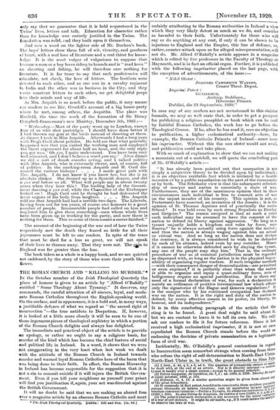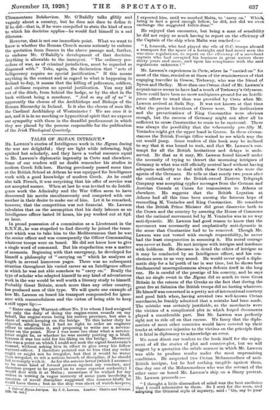THE ROMAN CHURCH AND "KILLING NO MURDER." IN the October
number of the Irish Theological Quarterly the place of honour is given to an article by "Alfred O'Rahilly" entitled "Some Theology About Tyranny." It deserves, nay commands, the careful attention of all sincere, loyal, and mode- rate Roman Catholics throughout the English-speaking world. On the surface, and in appearance, it is a bold and, in many ways, a justifiable defence of what we regard as "the sacred right of insurrection "—the true antidote to Despotism. If, however, it is looked at a little more closely it will be seen to be one of those ingenuous pieces of theological sophistry in which a portion of the Roman Church delights and always has delighted.
The immediate and practical object of the article is to provide an apology, or rather we ought to say a religious basis, for murder of the kind which has become the chief feature of social and political life in Ireland. In a word, it shows that we were not exaggerating in the very least when last week we dealt with the attitude of the Roman Church in Ireland towards murder and warned loyal Roman Catholics here of the harm that was being done to their faith. In effect, the Roman Hierarchy in Ireland has become responsible for the suggestion that it is not a sin to commit suicide if it will injure the British Govern- ment Even if you kill your neighbour as yourself your priest will find you justification if, again, your act was directed against the British Government.
It will no doubt be said that we are making an absurd fuss aver a magazine article by an obscure Roman Catholic and most
• The frith Moto:Veal Quarterly. Dublin: OM and Boa. [25. Od.]
unfairly attributing to the Roman authorities in Ireland a view which they very likely detest as much as we do, and consider as harmful to their faith. Unfortunately for those who will say or do anything at any cost, if only it can be shown to be injurious to England and the Empire, this line of defence, or, rather, counter-attack upon us for alleged misrepresentation,will
not do. Mr. Alfred O'Rahilly's article appears in a magazine, which is edited by five professors in the Faculty of Theology at Maynooth, and is in fact an official organ. Further, it is published
with the following imprimatur placed on the last page, with the exception of advertisements, of the issue:—
" Nihil Obstat :
JOANNES CANONICIIS WATERS, Censor Theol. Depot, /mprimi Poleal GCLIELMITS,
Arohiep. Dublinen., Hiberniao Primes.
Dublini, die 23 Septombris, 1320."
In case any of our readers are not accustomed to this sinister formula, we may as well state that, in order to get a passport for publishing a religious pamphlet or book which can be read by faithful Roman Catholics, the work has to go before tho Theological Censor. If he, after he has read it, secs no objection to publication, a higher ecclesiastical authority—here, for example, the Roman Catholic Primato of Ireland—must issuo his l'inprirriatur. Without this the MTh °hetet would not avail, and publication could not take place.
With so much of explanation to show that we are not making a mountain out of a molehill, we will quote the concluding part
of Mr. O'Rabilly's article ;-
"It has already been pointed out that usurpation is not simply a subjective theory to be decided upon by individuals ; it is an objective verifiable fact which is initiated by it hostile invasion or by a public repudiation on the part of the community or by both. The Scholastic view is that the subsequent relation- ship of usurper and nation is essentially a state of war. Furthermore, they are of the unanimous opinion that in these circumstances each individual is free to commit acts of war on the unjust invader of his country. This opinion is not, as Protestants have asserted, an invention of the Jesuits ; it is the opinion of St. Thomas Aquinas and of practically the entire School." It was held even by such strong Royalists as Barclay and Gregoire.' The reason assigned is that at such a crisis each individual may be assumed to have the consent of the nation to defend its liberty against aggression. So long as a tyrant unjustly holds a kingdom and rules by force,' says Suarez,' he is always actually using force against the nation ; and thus the nation is always waging against him an actual or virtual war. And so long as the nation does not declare the contrary, it is always considered to wish to be defended by each of its citizens, indeed oven by any outsider. Hence if it cannot be otherwise defended save by slaying the tyrant any one of the people may slay him.' That is, the ordinary procedure of war as of criminal jurisdiction must be regarded as dispensed with, so long as the nation is in the physical impos- sibility of organizing regular warfare. If such irregular methods —with their consequent danger of demoralization—are permitted or even enjoined,* it is perfectly clear that when the nation is able to organize and equip a quasi-military force, acts of belligerency require no special justification. Nor is there any need of a formal declaration of war, for such a declaration is merely an ordinance of positive international law which affects only the signatories of the Hague and Geneva regulations.3 It is the usurper who by his continued occupation has declared war on the nation. It is the right and duty of the nation to defend, by every effective means in its power, its liberty, fie honour, and its independence."
It is in this concluding paragraph of the article that the sting is to be found. A great deal might be said about its but we are content to leave it to tell its own tale. We only' ask our readers to file it for future reference. Since it has received a high ecclesiastical imprimatur, if it is not at ones repudiated the Roman Church stands before the world 53 endorsing the doctrine of private assassination as a legitimate form of civil war.
Incidentally, Mr. O'Rahilly's general contentions in regard to Insurrection seem somewhat strange when coming from these who refuse the right of self-determination to North-East Ilhiter. North-East Ulster is, in truth, the great obstacle to Sinn Fri'
(1) 2 Sod., 5.44. q 2, a 2, ad 5. The question of tyrannicide cannot of cOC be dealt with at the end of an article. Nor Is It directly relevant—a Mx tyrant is hardly ever a single person--except in its general prinelPie• (2) Petrus G regorius, De republics. 20. 7.5 ; ed. 1009, U. 223b. Darne)- et 'Natipoteetate, 1600. p. 268. (3) Defensia. vi. 4, 13. A similar quotation might be gives from almost sal of the great Schoolmen. (4) 51 commode id lied potest,teneblturin conselentin Ilium occidere proPs2, suisque liberandls ab iniusta veratione, cum sit manifestos invasor 00470 bonoque comment InimIcus.—Petrus a Navarra, De atdatorion restia■Doml.;g* (1585,1. 308). So also Petrus de Aragonia. its issatitut et jars (1590).2- 2. lirdos (5) The pointls thatsuch declaration Is not necessary for theme of a war of self-defence. It might be advisable, 0.4., if it Wald induce the 64," to observe the laws of war. Ultramontano Bolshevism. Mr. O'Rahilly talks glibly and vaguely about a country, but he does not dare to define it- If ho did—that is, if he were compelled to state the kind of area to which his doctrine applies—he would find himself in a sad dilemma.
However, that is not our immediate point. What we want to know is whether the Roman Church means seriously to endorse the quotation from Suarez in the above passage and, further, to endorse Mr. O'Rahilly'a development of that doctrine. Anything is allowable to the insurgent. "The ordinary pro- cedure of war, as of criminal jurisdiction, must be regarded as dispensed with." Take, again, the declaration that "acts of belligerency require no special justification." If this means anything in the context and in regard to what is happening in Ireland to-day, it means that the killing of policemen, soldiers, and civilians requires no special justification. You may kill out of the ditch, from behind the hedge, or by the shot in the back without being a murderer. "And so say alt of us" is apparently the chorus of the Archbishops and Bishops of the Roman Hierarchy in Ireland. Is it also the chorus of men like the Cardinal Archbishop of Westminster ? We are sure it is not, and it is in no mocking or hypocritical spirit that we express our sympathy with them in the dreadful predicament in which they are placed by the persons responsible for the publication of the Irish Theological Quarterly.







































 Previous page
Previous page